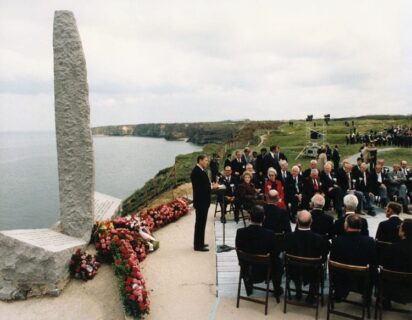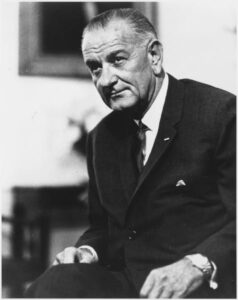
Reagan Commemorates D-Day
This year marks the 70th anniversary of D-Day—June 6, 1944—when Allied forces landed on the shores of Normandy and began fighting to retake northern continental Europe from Nazi occupation. Today only a few veterans of that battle remain; but on the fortieth anniversary of D-Day, many traveled back to Normandy to commemorate this costly but remarkably successful operation, the largest seaborne invasion in history. Before a group of Army Ranger veterans gathered at Pointe du Hoc, the site where they had struggled through a hail of German gunfire to mount the cliffs and destroy a coastal gun battery, President Reagan delivered a moving speech. He praised the courage of the Rangers and of other Allies—British, French, Polish and Canadian—who assured the success of the invasion.
What is most notable about Reagan’s 1984 speech, however, was the public reminder he issued, that “not all that followed the end of the war was happy or planned. Some liberated countries were lost. The great sadness of this loss echoes down to our own time in the streets of Warsaw, Prague, and East Berlin. Soviet troops that came to the center of this continent did not leave when peace came. They’re still there, uninvited, unwanted, unyielding, almost 40 years after the war.”
In contrast to his predecessor Jimmy Carter, who blamed an “inordinate fear of communism” for American failure to consistently promote human rights and to work toward nuclear disarmament, Reagan implicitly announced that the restoration of independence to Soviet-occupied nations would have to precede arms reduction:
We in America have learned bitter lessons from two World Wars. It is better to be here ready to protect the peace, than to take blind shelter across the sea, rushing to respond only after freedom is lost. We’ve learned that isolationism never was and never will be an acceptable response to tyrannical governments with an expansionist intent.
But we try always to be prepared for peace; prepared to deter aggression; prepared to negotiate the reduction of arms; and, yes, prepared to reach out again in the spirit of reconciliation. In truth, there is no reconciliation we would welcome more that a reconciliation with the Soviet Union, so, together, we can lessen the risks of war, now and forever.


